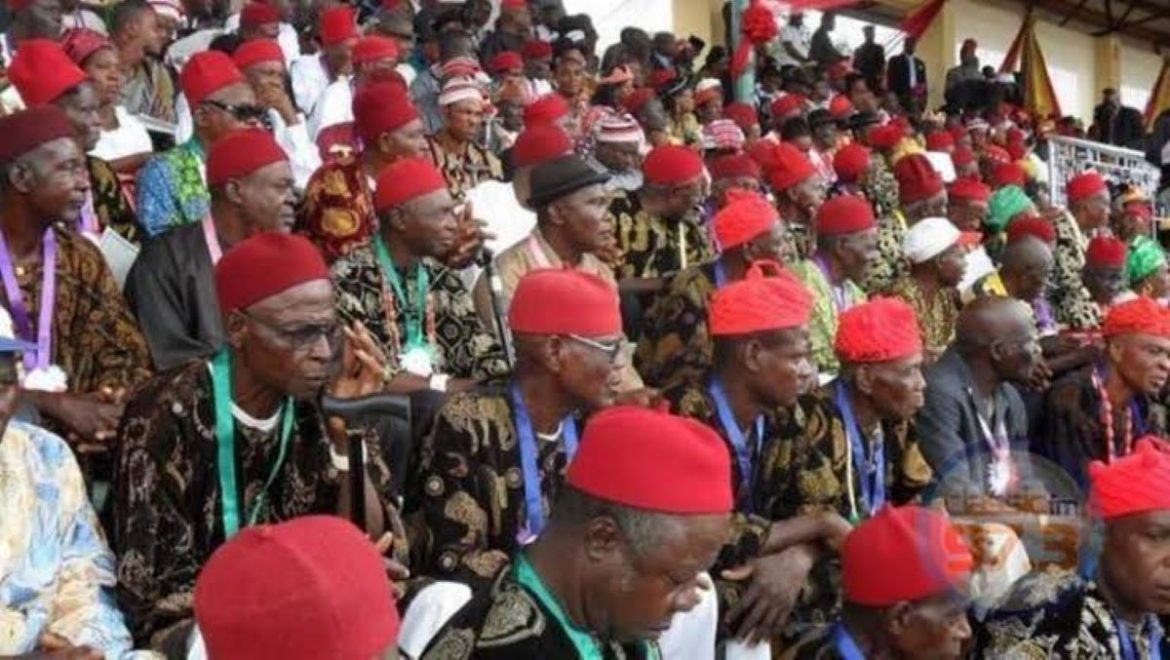792
By Tracy Moses
Traditional rulers of Nigeria’s South-East extraction have urged the federal government to grant them constitutional recognition, arguing that this would significantly enhance efforts to combat insecurity and promote national unity and development.
Their appeal came during the South-East Zonal Public Hearing on the 1999 Constitution Review for Imo and Abia States, held Saturday in Owerri, the capital of Imo State.
Speaking at the event, Chairman of the Imo State Council of Traditional Rulers, Eze C. Okeke, said that traditional leaders had undertaken extensive consultations before submitting their formal position to the House of Representatives Committee on the Constitution Review.
He proposed a constitutional amendment that would formally create a National Council of Chiefs with clearly defined responsibilities within Nigeria’s governance structure.
According to Eze Okeke, “We recommend that each geopolitical zone nominate three monarchs to be part of a restructured Council of Chiefs. At the national level, there should be a National Council of Traditional Rulers chaired by the President and comprising state traditional council chairmen and two additional representatives from each state and the FCT.”
He said the council would offer guidance on cultural, religious, and traditional matters, foster peace and social cohesion, help resolve communal conflicts, and rally grassroots support for government initiatives.
In a separate development, the South-East chapter of Organised Labour voiced strong opposition to a proposal to shift labour matters from the Exclusive Legislative List to the Concurrent List.
Representing the labour groups, Comrade Uche Chikemedu argued that such a change would violate Nigeria’s obligations to the International Labour Organisation (ILO) and destabilize the country’s labour regulatory framework.
“We firmly reject this amendment. Labour belongs on the Exclusive List to maintain uniformity and reflect our international commitments,” Chikemedu asserted.
He recalled that Nigeria ratified ILO Conventions 89 and 98 shortly after gaining independence in 1960, thereby affirming federal control over labour issues. He warned that transferring authority to the states, non-sovereign entities, could lead to jurisdictional chaos and weaken national labour protections.
Chikemedu further pointed to the National Industrial Court’s exclusive jurisdiction over labour disputes as a clear reason why labour matters should remain under federal purview. He also cautioned that allowing states to set individual minimum wages would erode the national social safety net.
“The national minimum wage is protected under ILO Convention 026, which Nigeria ratified in 1961. Letting each state decide its own wage undermines this international standard,” he warned.
Meanwhile, women’s organizations across the South-East geo-political zone strongly supported a proposed constitutional amendment that would create additional legislative seats specifically reserved for women.
Hon. Dr. Blessing Nwabala, who spoke on behalf of the groups, said the measure is essential not just for gender balance, but for the growth and resilience of Nigerian democracy.
“Democracy cannot flourish when half of the population is shut out. Supporting this bill means answering the demands of Nigerian women and aligning with global best practices,” she noted.
Nwabala stated that the bill seeks to establish 182 new seats exclusively for women across the national and state legislatures. “These seats symbolize more than just numbers, they stand for equity, empowerment, and a shared future,” she said.
She added that from rural communities to urban centers, women across the region have expressed their desire for representation and inclusion in governance.
“We’re not asking for favors, we’re demanding fairness, recognition, and the right to contribute meaningfully to Nigeria’s development,” she declared.



